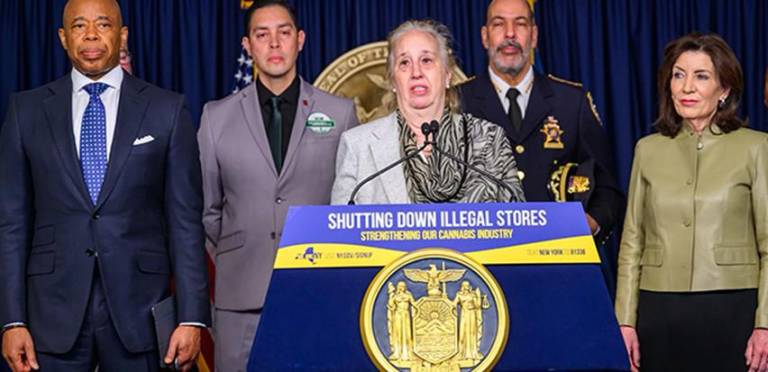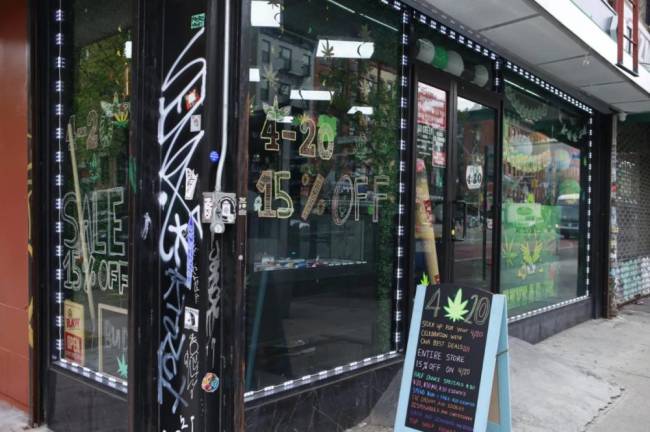State to Pull Lotto, Liquor Licenses From Bogus Weed Shops as City Given Padlock Power
Upper West Side council member Gale Brewer, who has been on a relentless campaign against illegal weed shops was invited to the bill signing by Gov. Kathy Hochul and Mayor Eric Adams on April 19. The head of the state’s cannabis agency was notably absent from the bill signing ceremony. This story originally appeared April 19 in THE CITY, a not for profit news site that covers city government.


New York City will have more power to crack down on illegal cannabis shops, the governor announced Friday, in a deal that will also empower the state to revoke liquor, tobacco and lottery licenses from businesses selling illegal weed.
The measures would allow the state Office of Cannabis Management and other law enforcement agencies to immediately padlock businesses found to be illegally selling cannabis and posing an “imminent threat” to the health and safety of people, such as sales to minors or products that haven’t been tested according to state laws.
The announcement, made by Gov. Kathy Hochul, standing beside by Mayor Eric Adams and the city’s Sheriff Anthony Miranda, was made as part of this year’s state budget negotiations in Albany.
Noticeably missing from the announcement was the head of the Office of Cannabis Management, Chris Alexander. The governor last month called for a review of the office amid the slow licensing of cannabis businesses from the office.
Hochul said community leaders and legal dispensary owners across the state have been frustrated with the illegal pot shops because they often sell products that appeal to children, don’t pay taxes and source their cannabis from outside the state.
“In so doing, they make a mockery out of our laws, and believe that nothing will ever stop them, and until today, they’ve mostly been right,” Hochul said. “My friends, the insanity stops right now.”
Both the state and the city have struggled to close down illegal cannabis shops, with about 2,000 operating in just New York City by some estimates from local officials—eclipsing the 40 or so legal dispensaries in the five boroughs.
Enforcement of weed law has been mostly toothless, with Hochul herself saying the cannabis rollout was a “disaster” as a result. The state has collected a small fraction of the millions of dollars it’s levied in fines, and weed shops have reopened shortly after law enforcement closed them down.
Under the new rules, New York City will be given immediate enforcement powers, allowing the city to seize cannabis and padlock stores, according to the governor’s office. The city will be able to conduct administrative hearings within five days of a padlock order and will provide a decision within four days after the hearing.
Other changes mentioned by Hochul include: $50,000 fines for landlords who fail to begin eviction proceedings for tenants known to be violating the cannabis laws; and the creation of a statewide task force that will aim to address the pipeline of illegal cannabis that illegal stores rely on.
Adams, who had listed expanded enforcement powers for the NYPD to crack down on the illicit shops as one of his priorities for this Albany session, welcomed the changes. He said that illegal cannabis activity has become a quality of life issue in the city, and he applauded the governor’s decision to potentially revoke liquor, tobacco and lottery licenses.
“As the governor stated, illegal cannabis shops, this is your warning: you will be locked out if you attempt to continue to sell illegal items,” Adams said.
Also at the announcement was Councilmember Gale Brewer (D-Manhattan, 6th Council District) who has been on a quest to root out illegal shops in her Upper West Side district, calling on law enforcement to do more. She said illegal weed shops are opening up near schools and liquor stores and feature advertisements that appeal to children.
“They’re illegal, and all these wonderful individuals—not only doing their wonderful work of legal cannabis shops, but also just legal stores trying to make a business successful—have to deal with this next door,” Brewer said.